WinCU Family & Friends Blog

Home Buying with Rates Rising
Some of the factors going into the price increases include an excess of money because of the COVID-19 stimulus, supply chain disruption economic shutdowns caused by the pandemic, and the Ukrainian war triggering sanctions and embargoes on Russian oil. The US central bank raises the federal funds rate to curb continued price hikes and higher inflation. However, the federal funds rate is the rate at which banks borrow from each other. Thus, it has an overnight impact on all interest rates because all other rates set fluctuate with it. The Fed balances controlling inflation with the negative impacts it can have on the economy.
When the Fed raises the federal funds rate it typically leads to higher interest rates across the board, mortgage rates are no exception. Some effects are buyers in this economy may qualify for a lower loan amount which is based on their down payment and their debt-to-income ratio. High rates mean spending more of your monthly income on your house. Plus, there may not be enough housing inventory to keep up with the supply in the area.
Now for the flip side, recently I saw it broken down in these terms, the prime mortgage rate in 2021 was 3%, and today it is 7%. For every $100,000 borrowed on a 30-year amortization, a 1% increase in the interest rate increases a total mortgage payment by $55.82 per month interest. A $100,000 mortgaged home with an increase in the interest rate of 4% from 2021 to today would mean an increase of $223.28 per month in interest today compared to last year.
Homes in the area have appreciated in value by about 10% over the last three years. Depending on the home this could be more or less, this is an average. With the increase, a $100,000 home could potentially be worth $110,000 one year from now. In that year, the homeowner would have paid 12 months of extra interest payments of $223.28 or about $2,679.36 in interest over the last year. $10,000 in value compared with $2,679.36 in interest isn’t that bad.
Everyone had different reasons for jumping into the market. Some may be starting a family while others might be retiring soon and want to scale back. If you wait long enough rates may come back down or they may continue to rise. If you lock into the present rate you could watch for a lower future rate and refinance.
